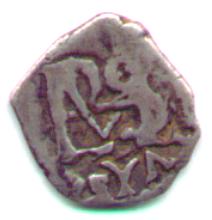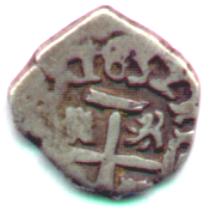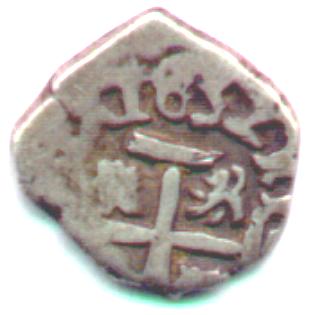| Philip
IV / Felipe IV
Toledo 1/2 Real 1652 Y
| ||
Obverse: PHILIPPVS monogram with crown above and legend around. The crown is not visible and only part of the legend is visible. The legend should read "PHILIPPVS · IIII · D · G". The visible part being "... PV Y SI..." of PHILIPPVS, of particular interest is the assayer Y, positioned within PHILIPPVS and below the monogram . Reverse: Cross with castles and lions in correct order. Legend around reads "HISPANIARVM REX 1652", with the visible part being "HIS...EX1652". Anverso: Monograma de PHILIPPVS coronado hacia arriba y con leyenda alrededor. La corona no es visible y sólo parte de la leyenda lo es. La leyenda sería “PHILIPPVS . IIII. D. G”., se alcanza a ver “…PV Y SI”. Reverso: Cruz con castillos y leones en orden correcto. La leyenda alrededor sería “HISPANIARVM.REX.1652”. Se lee, “HIS..EX 1652”. |
||
|
Due to their small size, half real coins are a difficult study. This intriguing coin came to us for study purposes and we thoroughly enjoyed the opportunity to research it. We are delighted with the opportunity to discover some new information or coin in the cob series. Los medios son difíciles de estudiar debido a su pequeño tamaño. Esta curiosa moneda nos llegó para estudio y nos encantó tener la oportunidad de investigarla. Nos agrada poder descubrir cualquier nueva información o moneda de la serie macuquina. This coin was an intriguing study because there is so much information in the coin, however the mint mark is not visible. We especially find the distinctive lion design interesting and focused on this characteristic during the research. We eventually concluded that the date is 1652, but at the beginning we were open to the dates of 1632 or 1652. The assayer mark "Y" is the most important element in the coin. Se trataba de un caso intrigante porque la pieza tenía mucha información auncuando la marca de ceca no era visible. Nos pareció muy característica la figura del león y nos enfocamos en esa característica. Eventualmente llegamos a la conclusión de que la fecha era 1652 aun cuando desde un principio esperábamos fechas entre 1632 y 1652. La marca del ensayador Y era el elemento fundamental. After many days of research, looking through hundreds of auction catalogs and our numismatic library it became clear that this coin was previously unpublished. We consulted with other numismatists and reached a conclusion with which we are confident in. Después de muchos días de investigación y de mirar centenares de catálogos de subasta y nuestra biblioteca numismática, quedaba en claro que esta moneda estaba inédita. Consultamos otros numismáticos y llegamos a la conclusión con la cual nos sentimos cómodos. |
||
|
Documentary evidence for attribution. As our specialty is Colombia, we searched our records related to the Colombian mint of Santa Fé, also known as Nuevo Reino. We could not find any record of an assayer "Y". A search through Don Josep Pellicer's Glosario de Maestros de Ceca y Ensayadores (Siglos XIII-XX) reveals that assayer "Y" in the years 1632 - 1652 could only be from Toledo, and only after 1650, which if valid, would date this coin 1652. Evidencia documental para la identificación. Siendo Colombia nuestra especialidad, examinamos los documentos de la ceca de Santa Fé, también conocida como Nuevo Reino. No encontramos referencias a ensayador “Y”. Buscando en el Glosario de Maestros de Ceca y Ensayadores (Siglos XIII-XX) de Josep Pellicer, encontramos que el ensayador Y entre los años 1632 y 1652 no podía ser sino de Toledo y sólo posterior a 1650, lo cual está de acuerdo con la fecha 1652. |
||
|
Design comparison with known Colombian half reals shows some similarities, especially in the monogram, but that alone is not conclusive, especially as the P & S do not touch on this coin. The lion design is unlike any Colombian half real that we know of. At this point we focused on the distinctive lion design and searched for a match, and we found it. Si comparamos el diseño con el de los conocidos de Colombia encontramos algunas similaridades especialmente en el monograma pero esto sólo no es concluyente especialmente por que la P y la S no se tocan en esta pieza. El diseño del león es distinto al de todos los medios colombianos que conocemos. Así que nos enfocamos en el león y encontramos algo correspondiente. We find two matches for the lion and surprisingly they are both in the same auction catalog. They are in the Ponterio and Associates sale #124 sold January 17th and 18th 2003 at the New York International coin show. The auction featured the John Davenport collection and the James Hunnicut collection of new world crowns, but I doubt that the two matches to the Toledo half reals were from these great collections. Encontramos dos similares por sorpresa en el mismo catálogo de subasta de Ponterio and Associates 124 de enero 17-18 de 2003 en la reunión internacional de Nueva York. El catálogo presentaba las colecciones de monedas del nuevo mundo de John Davenport y de James Hunnicut pero dudo que estas piezas correspondan a esta grandes colecciones.
Citations: Ponterio sale #124 lot 1562: "1/2 Real, (16)52, no assayer. Nuevo Reino mint. KM-8; cf.Cal-987c; RL-M16. Crude, uneven strike....." Ponterio sale #124 lot 1563: "1/2 Real, (1)660. KM-unlisted; RL-type M22C-9; Cal-unlisted. Struck with 1 real dies. Crude strike......." |
||
|
|
|
|
|
|
|
|
| Toledo 1/2 real |
Ponterio #124 Lot 1562 Copyright Ponterio & Associates |
Ponterio #124 lot 1563 Copyright Ponterio & Associates |
|
Please note that the images are not necessarily the same scale and are not struck from the same dies. A comparison of these three coins shows us a match of the lion used on the reverse of each. From Ponterio lot 1562 we can see the style of the numeral 5 in the date, confirming the date of the subject coin as 1652. Ponterio lot 1563 is most important for attribution, as it is a 1 real coin having on the obverse the arms of Portugal. New world mints, including Colombia, would not have included the arms of Portugal in the design of a coin struck in 1652 or 1660, therefore the coins must be Peninsular (Spain proper), adding further support that the mint is Toledo. Nótese que las monedas no están necesariamente en la misma escala y que no fueron acuñadas con los mismos troqueles. Si se comparan estas tres monedas se aprecia una coincidencia del león que se usó en los reversos. El estilo del numeral 5 de la fecha del lote 1562 de Ponterio, nos confirma que la fecha de la pieza en estudio es 1652. El lote 1563 de Ponterio es muy importante porque es una pieza de un real que incluye el escudete de Portugal. Las monedas del nuevo mundo, incluyendo las de Colombia no hubieran incluido el escudo de Portugal en una pieza fechada 1652 ó 1660 así que las piezas tienen que ser peninsulares, lo cual apoya el concepto de que sean de Toledo. Our conclusion is therefore that all three of these coins are from the mint of Toledo, and would be assayer "Y" if visible. Concluimos que las tres piezas provienen de la ceca de Toledo y que el ensayador debe ser “Y” aún cuando no sea visible. |
||
|
Here is an image of a Toledo half real showing where the mint mark " T" with " o" above would likely be located on the subject coin, if it were visible. Esta es la imagen de un medio de Toledo que muestra la marca de ceca “T” con una “o” arriba, si alcanzara a ser visible. We have personally examined this coin and the mint mark is unquestionably Toledo. Examinamos personalmente esta moneda y la marca es sin duda Toledo. |
||
Pellicer I Bru, Josep. 1997. Glosario
de Maestros de Ceca y Ensayadores (Siglos XIII-XX). Segunda Edicíon.
Madrid. Museo Casa de la Moneda, impreso Fábrica Nacional de Moneda y Timbre.
Ponterio & Associates, Inc. 2003 Public Auction Sale, New York, New
York, January 17 & 18, 2003. Published in San Diego, CA.
Spanish translation courtesy of Dr. Jorge Emilio
Restrepo. / La traducción en el español por la cortesía
de Dr. Jorge Emilio Restrepo.
Ponterio & Associates images used
with permission.
©Copyright Herman Blanton 2002, all
rights reserved.


